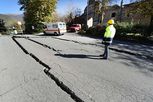Difference between revisions of "IS428 AY2019-20T1 Assign Damian Er Zhong Ying Observations"
(Created page with "<div style=background:#aec6cf border:#A3BFB1> 153px|left <b><font size = 6; color="#43464b"> VAST Challenge 2019 Mini-Challenge 1:<br>Crowdsourcing for...") |
|||
| Line 30: | Line 30: | ||
| − | <font size="4"><font color="#43464b">''' | + | <font size="4"><font color="#43464b">'''Observations and Insights'''</font></font> |
| + | <b> Question 1: Emergency responders will base their initial response on the earthquake shake map. Use visual analytics to determine how their response should change based on damage reports from citizens on the ground. How would you prioritize neighborhoods for response? Which parts of the city are hardest hit? Limit your response to 1000 words and 10 images.</b> | ||
| + | |||
| + | <b> Question 2: Use visual analytics to show uncertainty in the data. Compare the reliability of neighborhood reports. Which neighborhoods are providing reliable reports? Provide a rationale for your response. Limit your response to 1000 words and 10 images.</b> | ||
| + | |||
| + | <b> Question 3: How do conditions change over time? How does uncertainty in change over time? Describe the key changes you see. Limit your response to 500 words and 8 images.</b> | ||
| + | |||
| + | <b> Question 4: The data for this challenge can be analyzed either as a static collection or as a dynamic stream of data, as it would occur in a real emergency. Describe how you analyzed the data - as a static collection or a stream. How do you think this choice affected your analysis? Limit your response to 200 words and 3 images.</b> | ||
Revision as of 16:04, 13 October 2019
|
|
|
|
|
|
Observations and Insights
Question 1: Emergency responders will base their initial response on the earthquake shake map. Use visual analytics to determine how their response should change based on damage reports from citizens on the ground. How would you prioritize neighborhoods for response? Which parts of the city are hardest hit? Limit your response to 1000 words and 10 images.
Question 2: Use visual analytics to show uncertainty in the data. Compare the reliability of neighborhood reports. Which neighborhoods are providing reliable reports? Provide a rationale for your response. Limit your response to 1000 words and 10 images.
Question 3: How do conditions change over time? How does uncertainty in change over time? Describe the key changes you see. Limit your response to 500 words and 8 images.
Question 4: The data for this challenge can be analyzed either as a static collection or as a dynamic stream of data, as it would occur in a real emergency. Describe how you analyzed the data - as a static collection or a stream. How do you think this choice affected your analysis? Limit your response to 200 words and 3 images.
